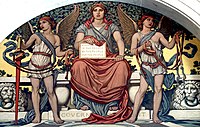
Photo from wikipedia
How do different professional structures shape the economic ideas with which international financial institutions derive legitimacy and authority for their policy decisions? The comparative professional field analysis proposed herein provides… Click to show full abstract
How do different professional structures shape the economic ideas with which international financial institutions derive legitimacy and authority for their policy decisions? The comparative professional field analysis proposed herein provides scholars with a new toolkit for answering this question on a more systematic basis than the existing approaches do. Through a novel combination of content, network and regression analysis the paper uncovers the precise role of role different qualifications, experiences and hierarchies in shaping the expertise invoked by the European Central Bank and the International Monetary Fund’s main policy documents, with a specific focus on debates over fiscal consolidation in the wake of the global financial crisis of 2008. The findings challenge much of the related scholarship about how economic ideas diffuse across professional fields and governance domains and where change on macroeconomic policy is likely to come from. As such, the proposed framework and the findings should be of interest to scholarship on international bureaucracies, the politics of professional knowledge and the international political economy of fiscal consolidation.
Journal Title: Public Administration
Year Published: 2019
Link to full text (if available)
Share on Social Media: Sign Up to like & get
recommendations!